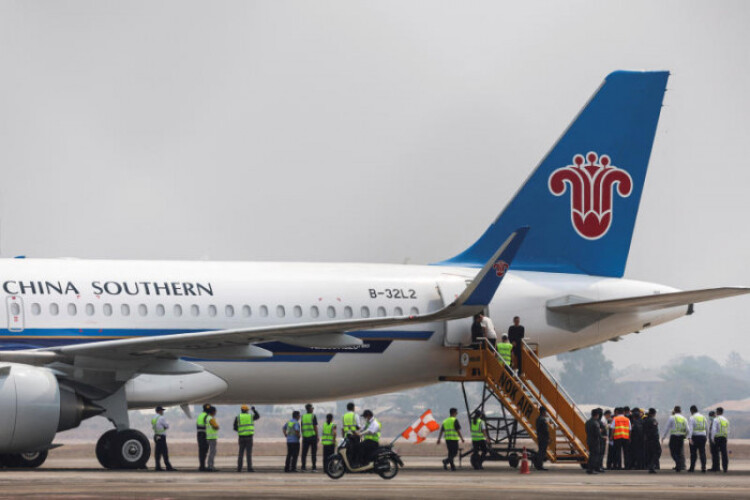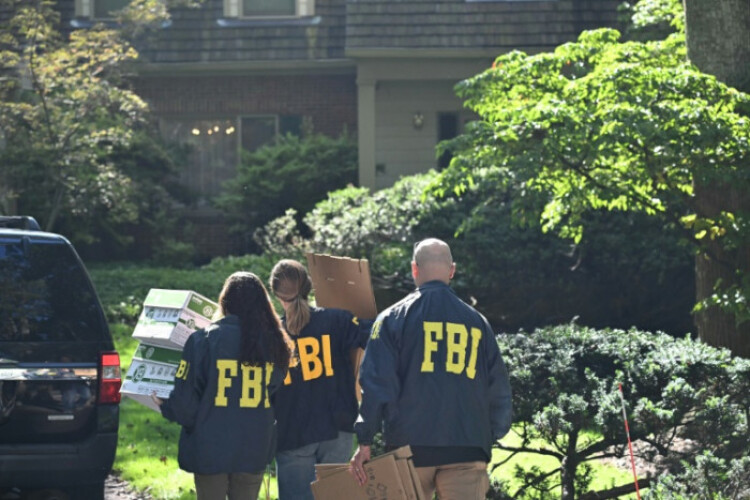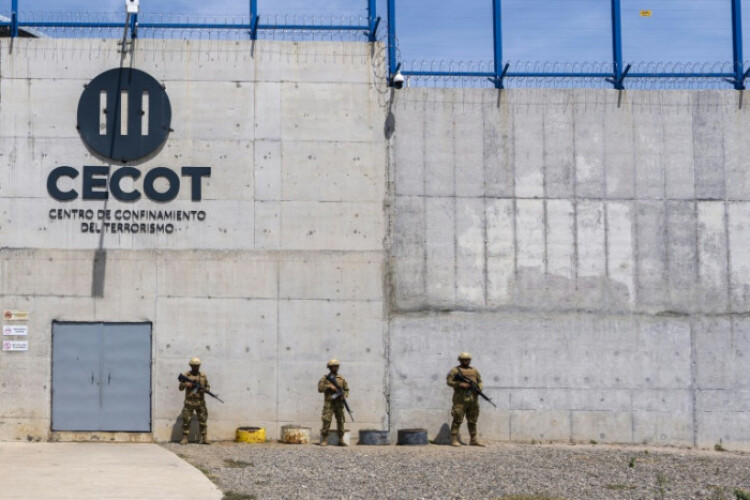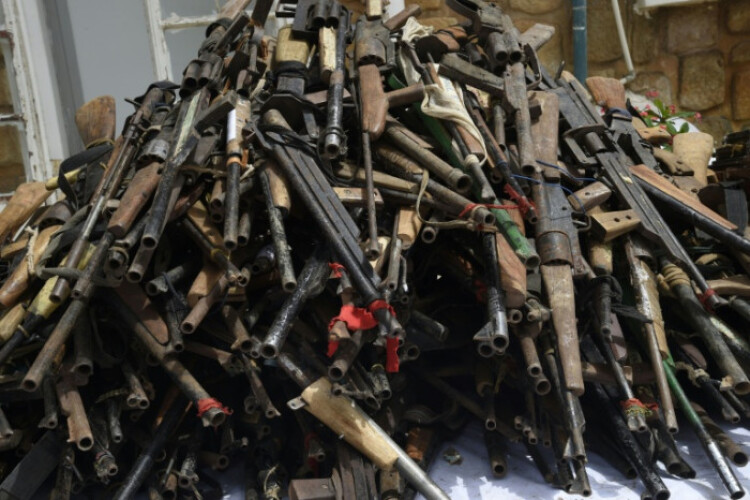
On Thursday, 200 Chinese nationals rescued from online scam centres in Myanmar were repatriated to China, while hundreds more are expected to arrive in China in the coming days, according to Beijing's Ministry of Public Security.
The repatriation operation came after a flurry of visits to Thailand and Myanmar by Liu Zhongyi, China's assistant minister for public security. Liu is now coordinating with the two Southeast Asian countries on cyber fraud operations in the region that police and human rights groups have said are involved in human rights abuses and criminal activity.
Meanwhile, some 8,000 kilometres away in the southwestern Pacific, a group of Chinese liaison officers was wrapping up police tactical training for local officers in the Solomon Islands earlier this month.
China is expected to increase this type of police diplomacy to expand its influence and protect overseas interests as the world's second largest economy, as well as the second biggest outbound investor and largest source of international tourists.
These types of foreign exchanges on law and order may improve China's image as a security partner in developing countries, but it is also coming under increasing international scrutiny, according to a China-based analyst.
The Chinese embassy in Honiara, the Solomons' capital, said on social media on Feb 11 that 30 local officers took part in the training. The topics covered included DNA evidence identification, investigating telecoms fraud, and sexual assault and drug crime prevention, aimed at equipping officers "with skills and tactics to guide and to strengthen the safety concept and improve their operational capabilities".
This was the first Solomons' first police training of the year by Chinese liaison officers, under a mechanism launched in 2022. It came weeks after Australia - apparently with China in mind - announced a AHK$190million (815 million baht) package to support the archipelago's police force, "thereby reducing its reliance on external partners over time", according to a joint statement by Australian Prime Minister Anthony Albanese and his Solomons counterpart Jeremiah Manele.
Li Zhiyong, an international relations professor with the University of International Business and Economics in Beijing, said: "As China's overseas economic influence expands around the world, there is a stronger need to project China's overseas interest, as well as the safety of Chinese nationals abroad.
"In cases such as the telecoms scams, it usually involves not just technical cooperation between the police forces but also coordination at foreign policy levels because of the complexity and the huge interest behind, so I think this is a trend."
Considered a niche area of traditional foreign policy, policing diplomacy empowers law enforcement representatives with diplomatic functions. They work to share intelligence, resolve conflicts and foster security and stability.
It is less sensitive than military cooperation but usually involves training, joint patrols or exports, or the donation of technologies and equipment to economically underdeveloped countries, according to Li, who specialises in China's international policing cooperation.
"The police training is more in the form of foreign assistance from China, because this is something the recipient nations need, and I think that could also help improve China's image in the region," he said.
China's police diplomacy has been largely carried out under international mechanisms such as Interpol, as well as anti-terrorism cooperation with regional groups, including the Shanghai Cooperation Organisation, a Eurasian political and security organisation formed in 2001 by China and Russia with Central Asian nations.
Meanwhile, Chinese police officers have been deployed to its embassies in at least 48 countries, where they work with local law enforcement authorities in tackling crimes involving or targeted at Chinese nationals "to better protect the personal safety and rightful interest of the Chinese citizens and companies", according to China's public security ministry in 2023.
Amid worsening geopolitical tensions with the United States, China is moving to promote itself as a security partner - and policing diplomacy has appeared to play a larger role.
In 2022, President Xi Jinping announced the Global Security Initiative, which called for "indivisible security" - different from the "collective security" on which the US alliance network is based - while advocating for greater security cooperation in "areas such as counterterrorism, cybersecurity, biosecurity, emerging technologies and international policing".
In March last year, Beijing revised its Organic Law of the State Council, mandating that state councillors take more responsibility for diplomacy. Since then, Wang Xiaohong, state councillor and public security minister, has been increasingly active in international scenarios, meeting counterparts from countries such as New Zealand, Finland and Iran with calls to strengthen cooperation in law enforcement.
Addressing the Conference of the Global Public Security Cooperation Forum in eastern China last September, Wang said China had trained 2,700 foreign law enforcement officers in 2023 and the number would grow to 3,000, with consultants deployed to countries in need in 2025.
By providing training and police equipment, China could enhance its own security and diplomatic position while avoiding acting as a guarantor, according to a research paper by the International Institute for Strategic Studies think tank.
According to the paper published in October, China's police training is focused on fostering security relations with places of strategic importance, including Africa and Latin America where China has a large business presence.
In an apparent effort to maintain stability at the borders, China has also trained officers in neighbouring countries in recent years. In 2023, a delegation from the Kyrgyzstan interior ministry visited the public security department of Xinjiang, in China's far west, with the two sides agreeing to strengthen cooperation on border force training.
Chinese police forces have also carried out joint patrols with their counterparts from Laos, Myanmar, Thailand, Vietnam and Cambodia.
Still, China's policing diplomacy faces increasing scrutiny.
In December 2022, Italy said its police would stop joint patrols with Chinese counterparts in its territory after rights activists claimed Beijing was using 102 Chinese "service stations" to pressure some Chinese expatriates to return to China to face criminal charges.
In January last year, Papua New Guinea, a Pacific island country, said it had put China's offer to help its struggling police force on hold after objections from Australia. Two months later, Fiji, another Pacific nation, said it had amended a 2011 policing agreement and removed Chinese officers embedded in its police force.
According to Li in Beijing, as power rivalry intensifies, scrutiny from the West will increase, although he said those concerns were overblown.
"Policing requires technologies and experience, and this is also what the recipient nations need," Li said.
"If the West is not happy with China's offers, they can also offer what they have - and I think that will also be beneficial to local people."
The repatriation operation came after a flurry of visits to Thailand and Myanmar by Liu Zhongyi, China's assistant minister for public security. Liu is now coordinating with the two Southeast Asian countries on cyber fraud operations in the region that police and human rights groups have said are involved in human rights abuses and criminal activity.
Meanwhile, some 8,000 kilometres away in the southwestern Pacific, a group of Chinese liaison officers was wrapping up police tactical training for local officers in the Solomon Islands earlier this month.
China is expected to increase this type of police diplomacy to expand its influence and protect overseas interests as the world's second largest economy, as well as the second biggest outbound investor and largest source of international tourists.
These types of foreign exchanges on law and order may improve China's image as a security partner in developing countries, but it is also coming under increasing international scrutiny, according to a China-based analyst.
The Chinese embassy in Honiara, the Solomons' capital, said on social media on Feb 11 that 30 local officers took part in the training. The topics covered included DNA evidence identification, investigating telecoms fraud, and sexual assault and drug crime prevention, aimed at equipping officers "with skills and tactics to guide and to strengthen the safety concept and improve their operational capabilities".
This was the first Solomons' first police training of the year by Chinese liaison officers, under a mechanism launched in 2022. It came weeks after Australia - apparently with China in mind - announced a AHK$190million (815 million baht) package to support the archipelago's police force, "thereby reducing its reliance on external partners over time", according to a joint statement by Australian Prime Minister Anthony Albanese and his Solomons counterpart Jeremiah Manele.
Li Zhiyong, an international relations professor with the University of International Business and Economics in Beijing, said: "As China's overseas economic influence expands around the world, there is a stronger need to project China's overseas interest, as well as the safety of Chinese nationals abroad.
"In cases such as the telecoms scams, it usually involves not just technical cooperation between the police forces but also coordination at foreign policy levels because of the complexity and the huge interest behind, so I think this is a trend."
Considered a niche area of traditional foreign policy, policing diplomacy empowers law enforcement representatives with diplomatic functions. They work to share intelligence, resolve conflicts and foster security and stability.
It is less sensitive than military cooperation but usually involves training, joint patrols or exports, or the donation of technologies and equipment to economically underdeveloped countries, according to Li, who specialises in China's international policing cooperation.
"The police training is more in the form of foreign assistance from China, because this is something the recipient nations need, and I think that could also help improve China's image in the region," he said.
China's police diplomacy has been largely carried out under international mechanisms such as Interpol, as well as anti-terrorism cooperation with regional groups, including the Shanghai Cooperation Organisation, a Eurasian political and security organisation formed in 2001 by China and Russia with Central Asian nations.
Meanwhile, Chinese police officers have been deployed to its embassies in at least 48 countries, where they work with local law enforcement authorities in tackling crimes involving or targeted at Chinese nationals "to better protect the personal safety and rightful interest of the Chinese citizens and companies", according to China's public security ministry in 2023.
Amid worsening geopolitical tensions with the United States, China is moving to promote itself as a security partner - and policing diplomacy has appeared to play a larger role.
In 2022, President Xi Jinping announced the Global Security Initiative, which called for "indivisible security" - different from the "collective security" on which the US alliance network is based - while advocating for greater security cooperation in "areas such as counterterrorism, cybersecurity, biosecurity, emerging technologies and international policing".
In March last year, Beijing revised its Organic Law of the State Council, mandating that state councillors take more responsibility for diplomacy. Since then, Wang Xiaohong, state councillor and public security minister, has been increasingly active in international scenarios, meeting counterparts from countries such as New Zealand, Finland and Iran with calls to strengthen cooperation in law enforcement.
Addressing the Conference of the Global Public Security Cooperation Forum in eastern China last September, Wang said China had trained 2,700 foreign law enforcement officers in 2023 and the number would grow to 3,000, with consultants deployed to countries in need in 2025.
By providing training and police equipment, China could enhance its own security and diplomatic position while avoiding acting as a guarantor, according to a research paper by the International Institute for Strategic Studies think tank.
According to the paper published in October, China's police training is focused on fostering security relations with places of strategic importance, including Africa and Latin America where China has a large business presence.
In an apparent effort to maintain stability at the borders, China has also trained officers in neighbouring countries in recent years. In 2023, a delegation from the Kyrgyzstan interior ministry visited the public security department of Xinjiang, in China's far west, with the two sides agreeing to strengthen cooperation on border force training.
Chinese police forces have also carried out joint patrols with their counterparts from Laos, Myanmar, Thailand, Vietnam and Cambodia.
Still, China's policing diplomacy faces increasing scrutiny.
In December 2022, Italy said its police would stop joint patrols with Chinese counterparts in its territory after rights activists claimed Beijing was using 102 Chinese "service stations" to pressure some Chinese expatriates to return to China to face criminal charges.
In January last year, Papua New Guinea, a Pacific island country, said it had put China's offer to help its struggling police force on hold after objections from Australia. Two months later, Fiji, another Pacific nation, said it had amended a 2011 policing agreement and removed Chinese officers embedded in its police force.
According to Li in Beijing, as power rivalry intensifies, scrutiny from the West will increase, although he said those concerns were overblown.
"Policing requires technologies and experience, and this is also what the recipient nations need," Li said.
"If the West is not happy with China's offers, they can also offer what they have - and I think that will also be beneficial to local people."






